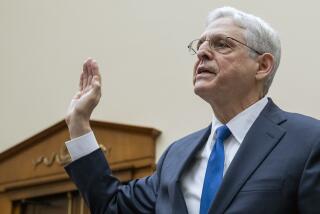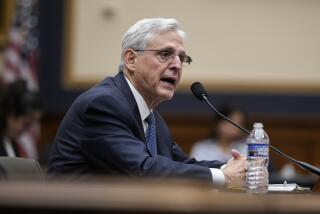Above All, a Chance to Rebut North Claim : For Meese, Time to Answer Critics
- Share via
WASHINGTON — Atty. Gen. Edwin Meese III knew full-well what awaited him when he got to Capitol Hill Tuesday morning.
His initial investigation of the Iran- contra affair had been publicly ridiculed ever since the celebrated congressional hearings got under way in the spring. The question even was raised whether his probe was part of a clever cover-up.
The unkindest cut of all had come from the chief functionary in the Iran operation, Lt. Col. Oliver L. North, who testified that he had shredded documents while Meese’s men sat no more than 10 feet away. The tale brought scorn from committee members such as Sen. Warren B. Rudman (R-N.H.), and caused punsters to rework the children’s tune into “Two Blind Meese, Two Blind Meese . . . .”
Chance to Comment
After pirouetting through the chronology of his investigation Tuesday, and setting himself for hours of questioning to come, Meese got his chance to say a word about North’s doing away with documents right under the noses of his investigators.
In short, the attorney general said, it didn’t happen--at least it didn’t happen within the sight or sound of William Bradford Reynolds and John Richardson, the Justice Department officials in question. In fact, said Meese, North’s shredder was out of commission at the time. What did happen was that Reynolds and Richardson found the notorious “diversion memo” showing that money from super-secret arms sales to Iran had been diverted to support the contras in Nicaragua.
After that, Meese, who had already known about the outreach to Iran for 11 months, concluded something was seriously amiss, he said.
Accused of harassment of some other witnesses, House select committee counsel John W. Nields Jr. Tuesday led Meese through an uncontentious account of his investigation from the moment he told President Reagan that there was widespread confusion about the Iran arms sale and recommended that the Administration get its story straight.
Meese fenced skillfully.
He was at pains not to criticize his old friend, CIA Director William J. Casey, for helping keep him in the dark; he smilingly brushed aside a suggestion that he was remiss in failing to take notes in conversations with Casey, Vice President George Bush, National Security Adviser John M. Poindexter, and Defense Secretary Caspar W. Weinberger; and he patiently defended his decision not to turn loose criminal investigators.
Second in Cabinet
Meese is the second member of President Reagan’s Cabinet to appear before the congressional inquest. But unlike Secretary of State George P. Shultz, who had proclaimed his opposition to the Iran arms sale publicly from the beginning, Meese is a member of the President’s personal inner circle.
Because he is, he stands to confront sharper questioning when he returns to the Senate caucus room today for a session expected to wear on into the evening.
There was a hint of it Tuesday when Rep. Peter W. Rodino Jr. (D-N.J.) criticized Meese’s handling of the investigation and suggested that Justice Department officials were unhappy that he had not turned it over to the criminal division.
There was a brief show of irritation from Meese, who demanded that Rodino back up the claim or withdraw it. When Rodino complained that the Justice Department’s response to committee requests had been less than satisfactory, the obviously prepared attorney general gushed statistics to refute him: His department, he said, had produced 39 officials for 30 interviews and 17 depositions consuming 146 hours of their time. Moreover, it had provided 36,000 pages of documents for the investigation.
“I don’t understand what the problem is,” he declared. “We have fully complied with everything the committee has requested.” Moreover, he said, there remains a desire and intention to cooperate.
Subject of Inquiry
Meese, himself the subject of an independent investigation into charges that he and friends used their influence to help a New York defense contractor, appeared without legal counsel and without congressional immunity.
Although conservatives on the committee assailed Shultz last week for what they regarded as inadequate efforts to dissuade Reagan from the Iran arms sales, they apparently had little inclination to try to discredit Meese’s investigation.
Rep. Bill McCollum of Florida, the Republican assigned to conduct the principal questioning of Meese, complained that already some of the committee questions sounded like “fly-specking,” looking for any little flaw to complain about.
The congressman was, he confessed, in a bit of a dilemma. He had found North an “excellent witness,” but nevertheless, he had to offer the attorney general, among other opportunities, the chance to deny North’s account of shredding documents in the presence of Meese’s investigators.
More to Read
Get the L.A. Times Politics newsletter
Deeply reported insights into legislation, politics and policy from Sacramento, Washington and beyond. In your inbox twice per week.
You may occasionally receive promotional content from the Los Angeles Times.









